Cover image: Children and youth, kids of campesinos, rest after playing soccer in the recuperated lands of the El Chile cooperative. Photo: Santiago Navarro F
Alongside the dirt road sit small wooden structures. Covered with nylon, they have roofs made of sheet metal and palm leaves. They call these shelters Champitas, occupied by hundreds of campesino families to defend the recuperation of these lands from the hands of the oil palm industry, in the valley of Bajo Aguán, municipality of Tocoa. In the 1970’s these lands were designated to the agrarian reform and during the 1990’s land grabbed by Corporación Dinant.
The resistance has been daily for sixteen months now, but the struggle for these lands has a much longer history. Wendy Castro, a young 26-year-old woman and single mother who showed us the land recuperation carried out by the cooperative El Chile, explains the reasons for their presence: “We are children, nieces, nephews, and grandchildren of former members, who were negatively affected by the dispossession of the lands from the agrarian reform,” she explains about the legitimacy of their actions.
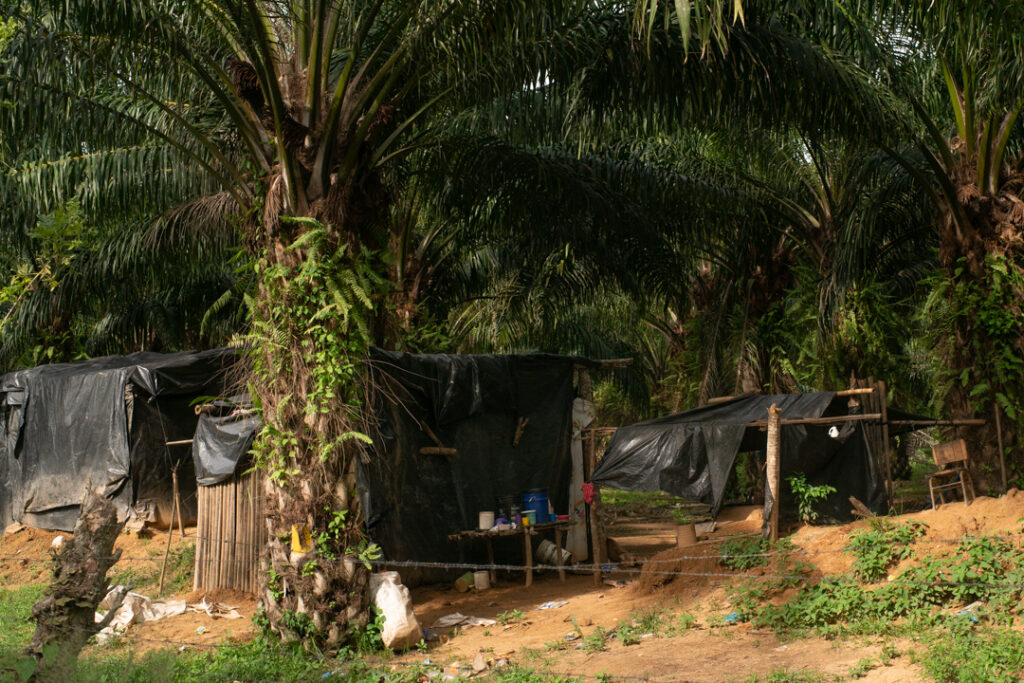
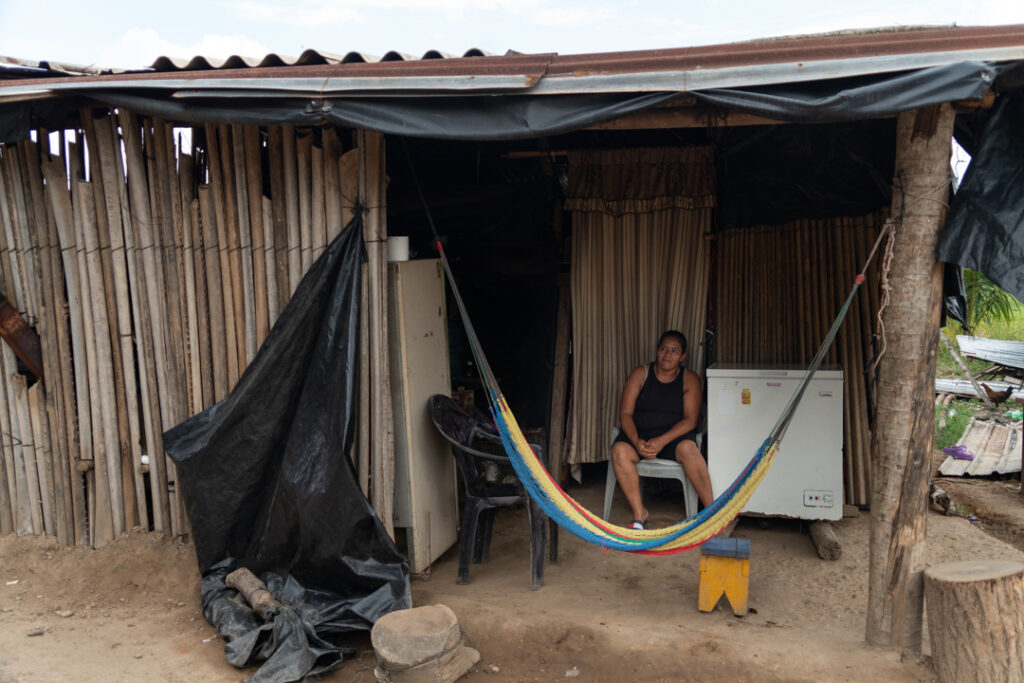
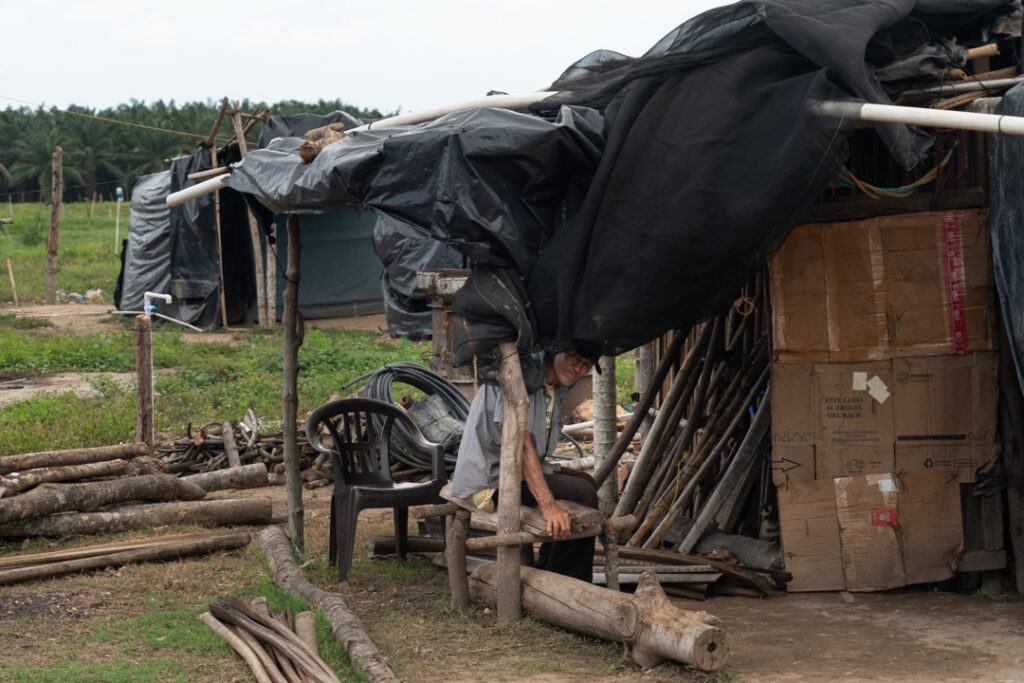
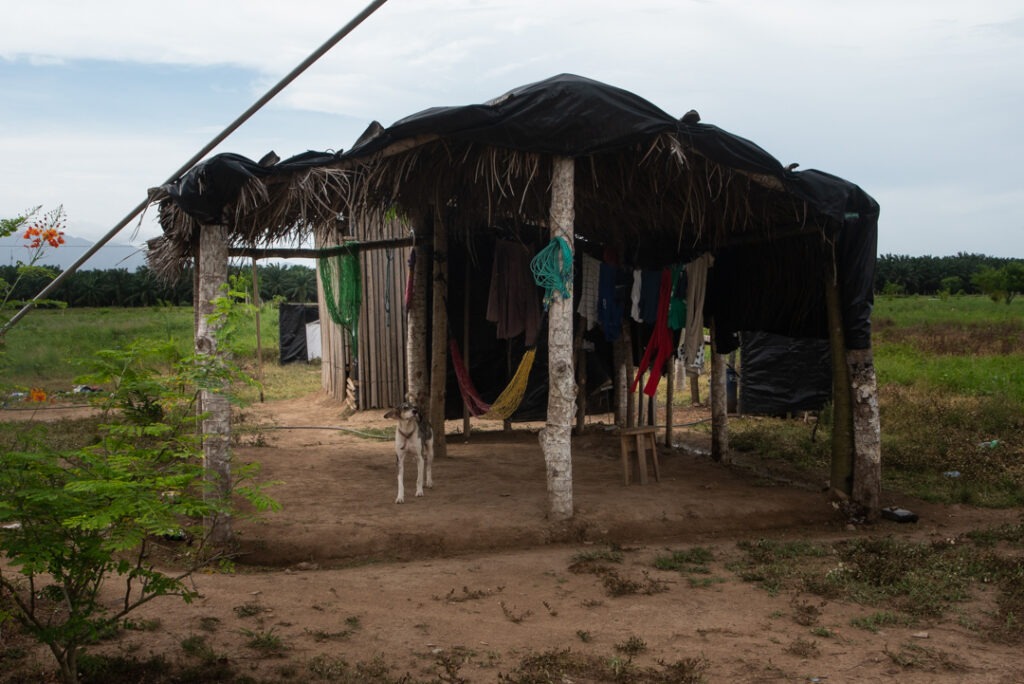
She refers to the dispossession caused by the oil palm agroindustrialists, who during the last three decades have taken away, via fraud and violence, the lands of the Department of Colón, assigned by the state of Honduras to the agrarian reform for campesino production.
Among the memories of her childhood, Wendy still remembers the stories of her parents and grandparents when they resisted the dispossession. Above all, she remembers the tragic consequences for her family and thousands of campesinos of the region who saw their dreams of farming their own land taken away.
In April of 1994, the lands assigned to the El Chile cooperative were taken via an illegal sale. As stated in complaints presented by the Agrarian Platform of Aguán before the Honduran Public Prosecutor’s Office, this transaction was carried out by people without legitimate representation of the campesinos, to transfer the territory into the hands of the company Agropecuaria Camaro, which in turn transferred the titles to Exportadora del Atlántico, belonging to the Honduran Corporación Dinant.
A member of the platform and also of the El Chile cooperative, Wendy says that the threat to the former owners, including her grandfather, was so great that, as happened to him, many died of desperation in the face of land grabbing by landowners from the families Facussé, Canales, and Morales.
“The lands are yours,” she recalls her father saying, who took on the responsibility of transmitting the history of these lands. Today these lands have been converted from oil palm production for exportation, to lands for food crops and the sustenance of 246 families in a disputed area covering 486 hectares.
The Agrarian Platform of Aguán is made up of 25 cooperatives seeking to recuperate their lands in the valley. In addition, there are associate campesino companies, which total 43 organizations, that seek through different forms of struggle to recuperate the lands that were taken from them.
According to Raúl Ramírez, who is part of the campesino company, La Lempira, and also a member of the platform, there are more than 46,000 hectares of land that they seek to recuperate from the oil palm agroindustrialists.
Lands for Oil Palm
Honduras has consolidated itself as an important country among the largest producers of oil palm in Latin America, only behind Colombia and Guatemala.
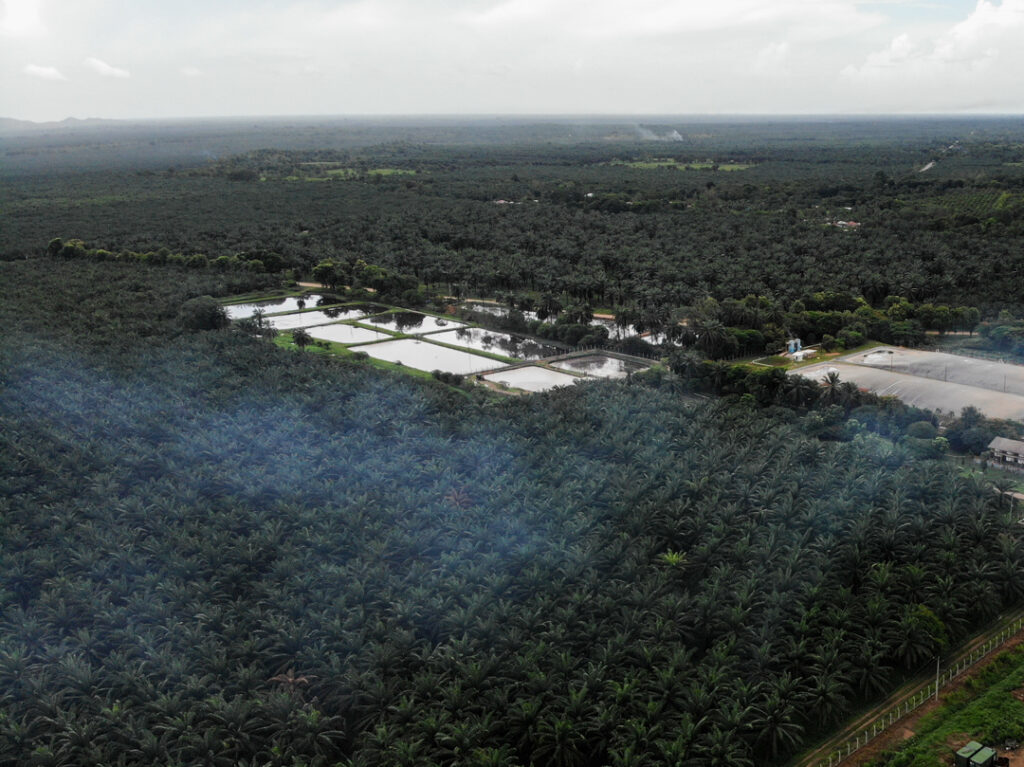
The Secretary of Agriculture and Livestock (SAG) points out that as of 2023 in Honduras, there existed 197,000 hectares with oil palm monoculture, of which between the years 2022 and 2023 reached a production of 600,000 metric tons per year. According to the United Nations Food and Agriculture Organization (FAO), this surface area represents more than 18% of the total available farming land in the Central American country.
Organization
A group of young people guard the access gates to the former oil palm plantation. “Viveros,” reads a sign in front of the metal gates, a vestige of the use that Corporación Dinant—the largest producer of palm oil in Honduras, which has 13,300 hectares of plantations—destined to the space.
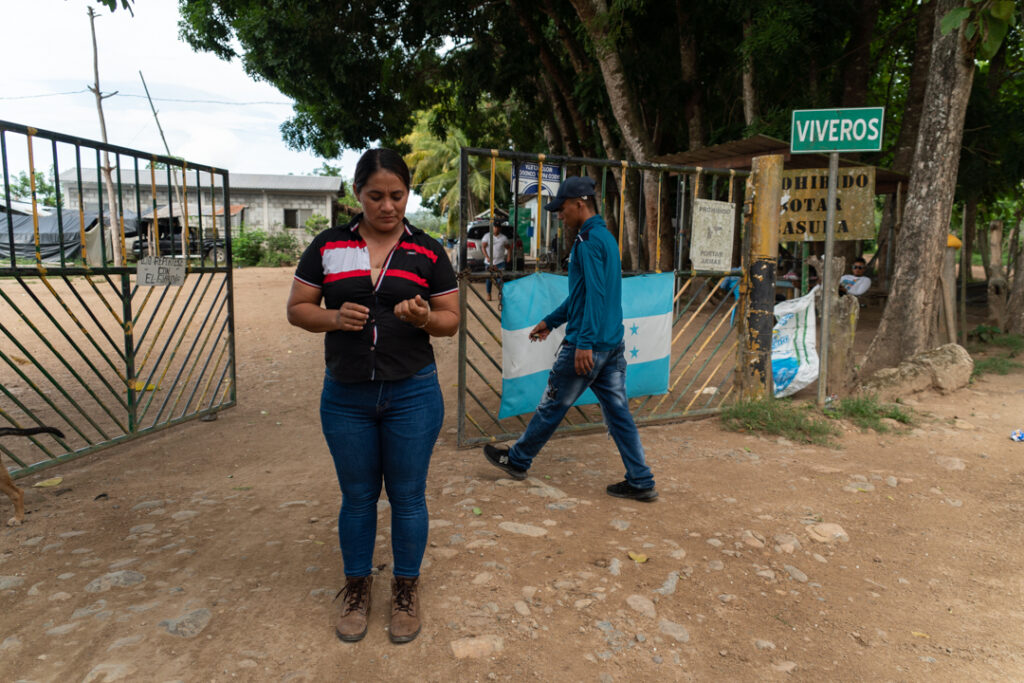
There, at the entrance to the El Chile cooperative, we spoke with Iris Lizeth Aguilar, who is part of the leadership, and who detailed the collective use of the land. The agreement between the families recuperating the land, she says, is that each associate is assigned a small piece of land to plant food, with which the same family can have multiple spaces for their crops, principally for self-sustenance.
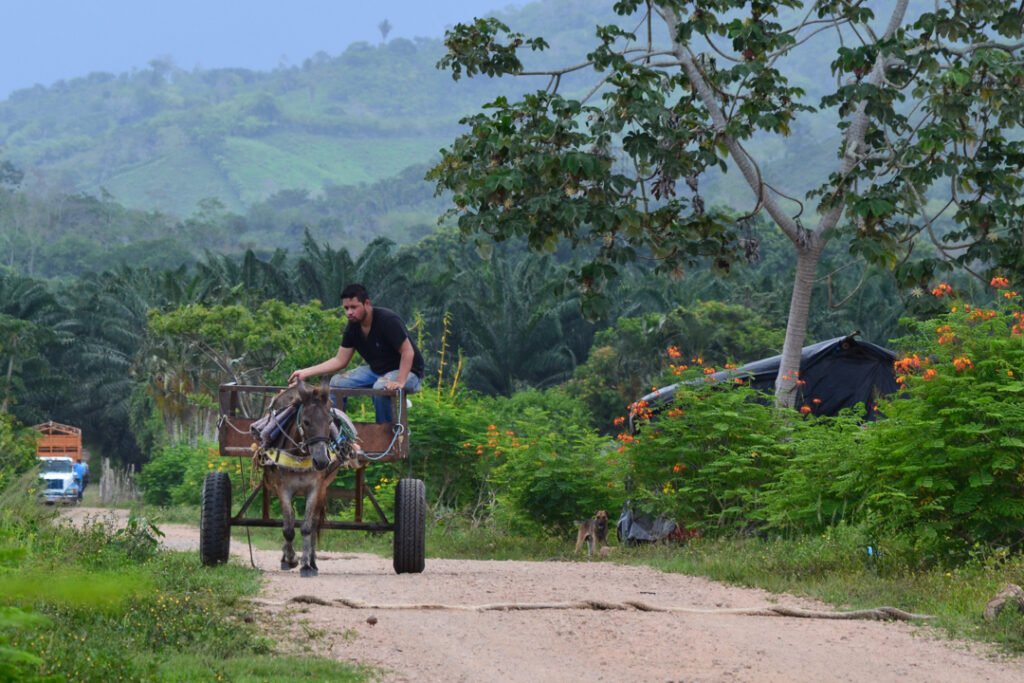
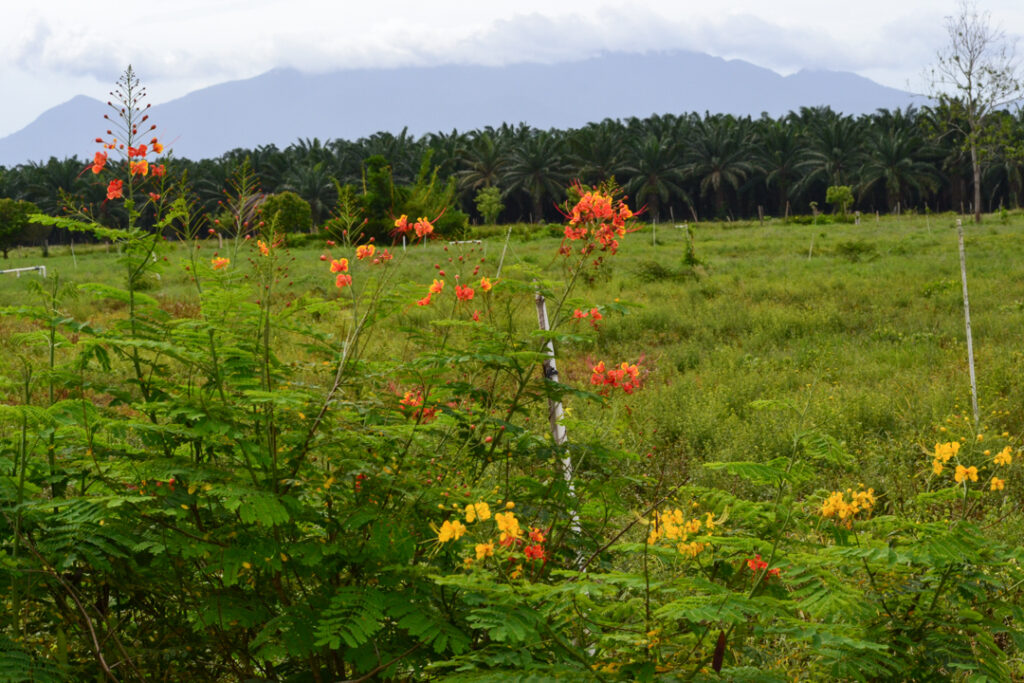
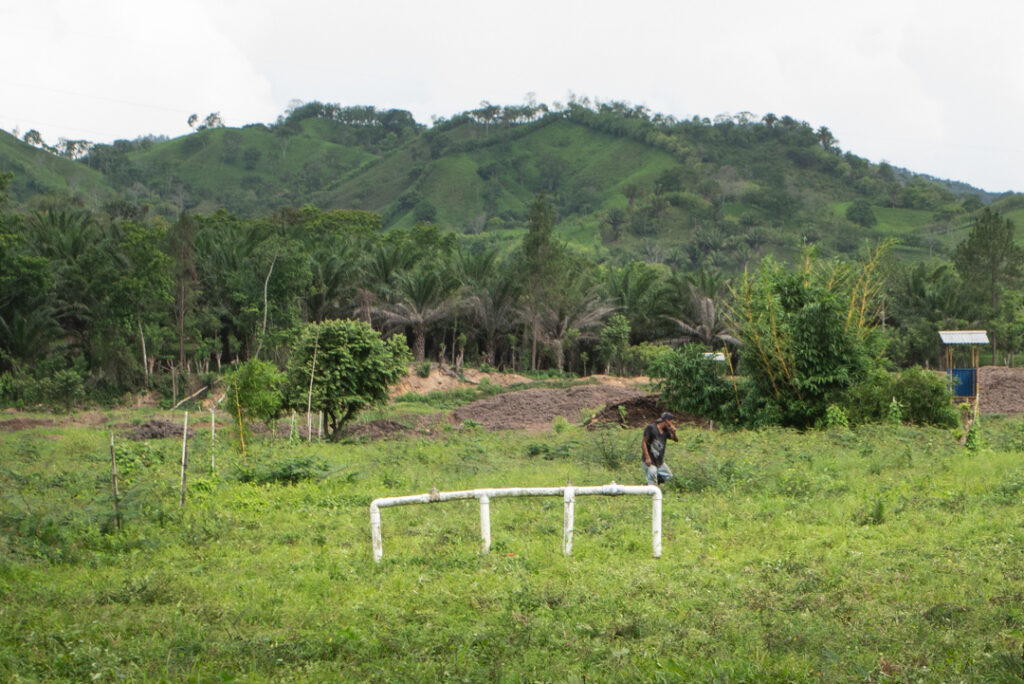
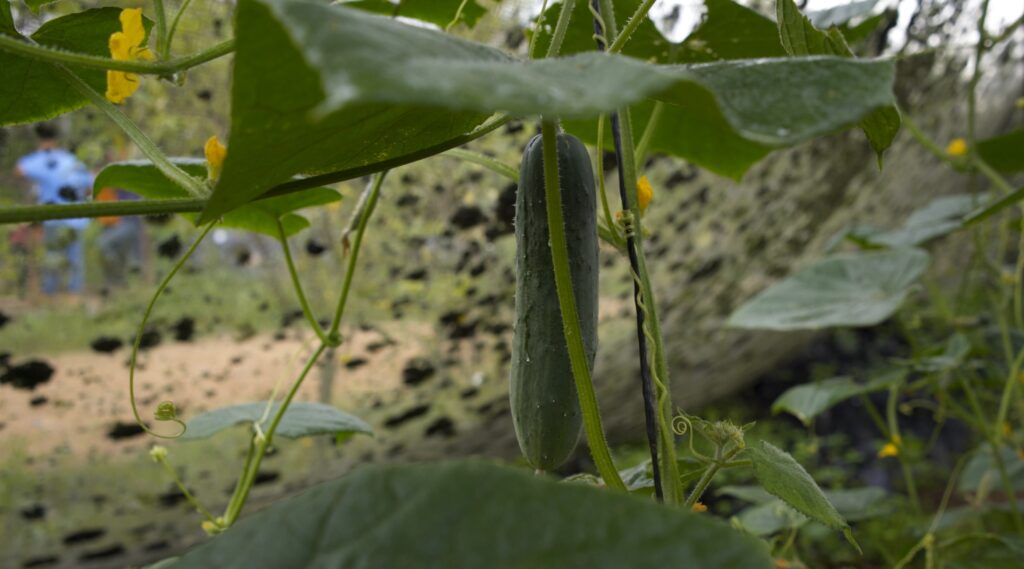
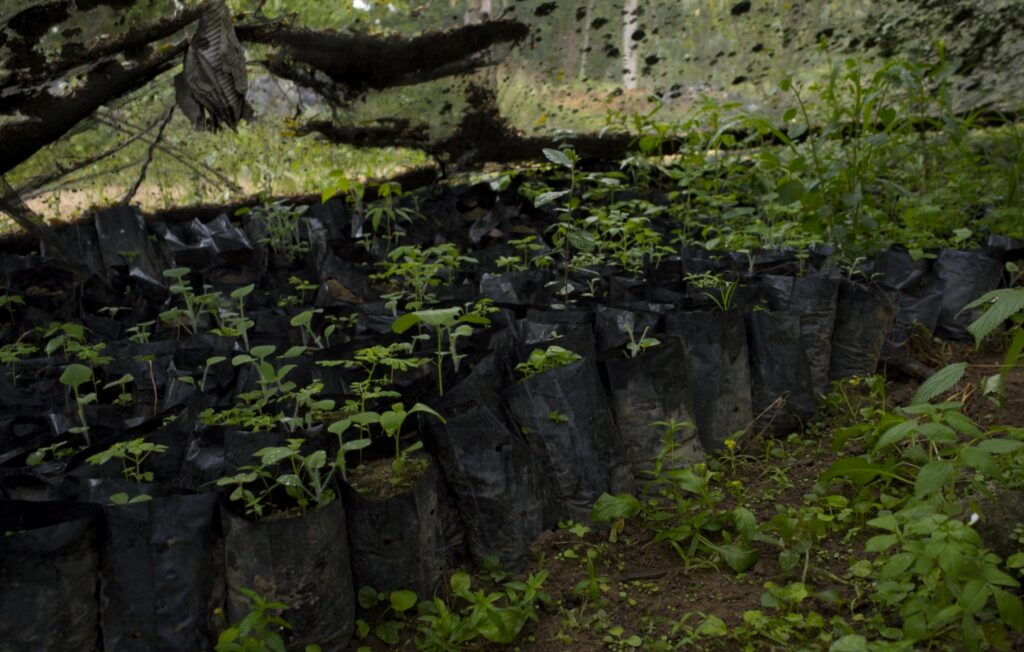
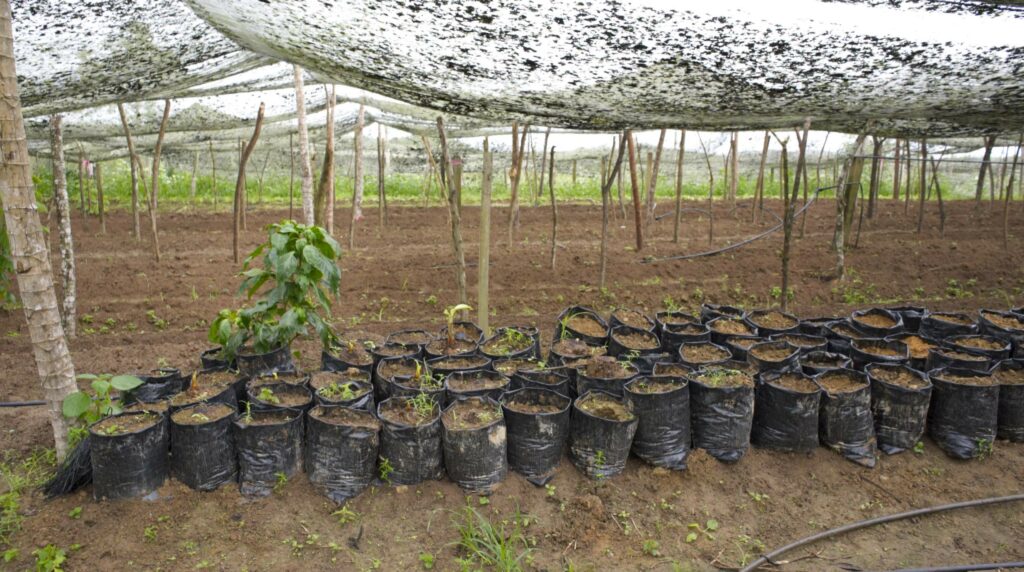
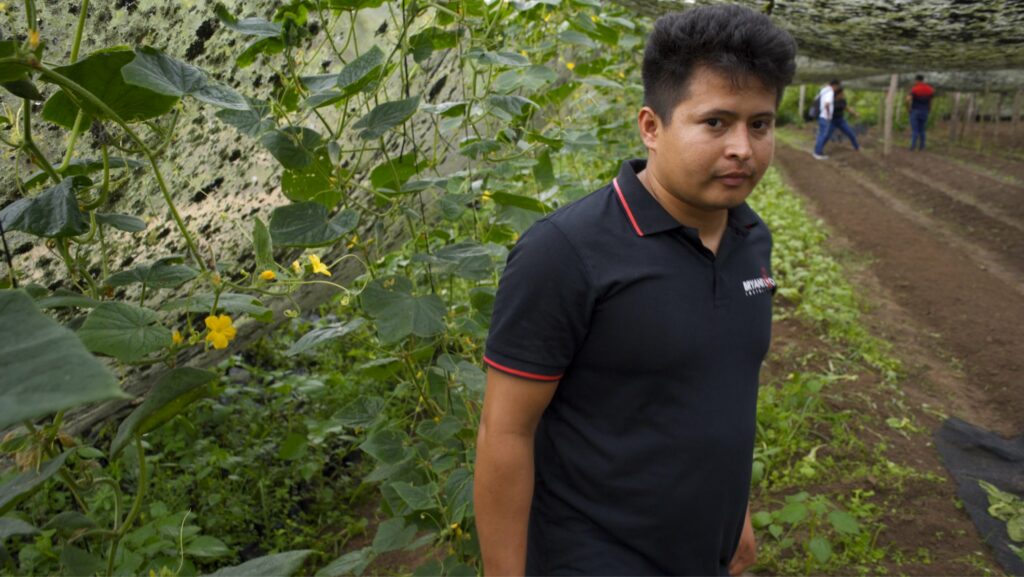
From inside the recuperated land, African palm monoculture can be seen completely encircling the campesino lands. The Department of Colón alone accounts for a quarter of the total existing crops in Honduras. Without being overwhelmed by the palm, the campesinos have cleared some areas to replant them with corn crops. Furthermore, they’ve constructed greenhouses where they produce tomatoes, chili, and greens. There are also areas with crops of yucca, fruit trees, and bananas.
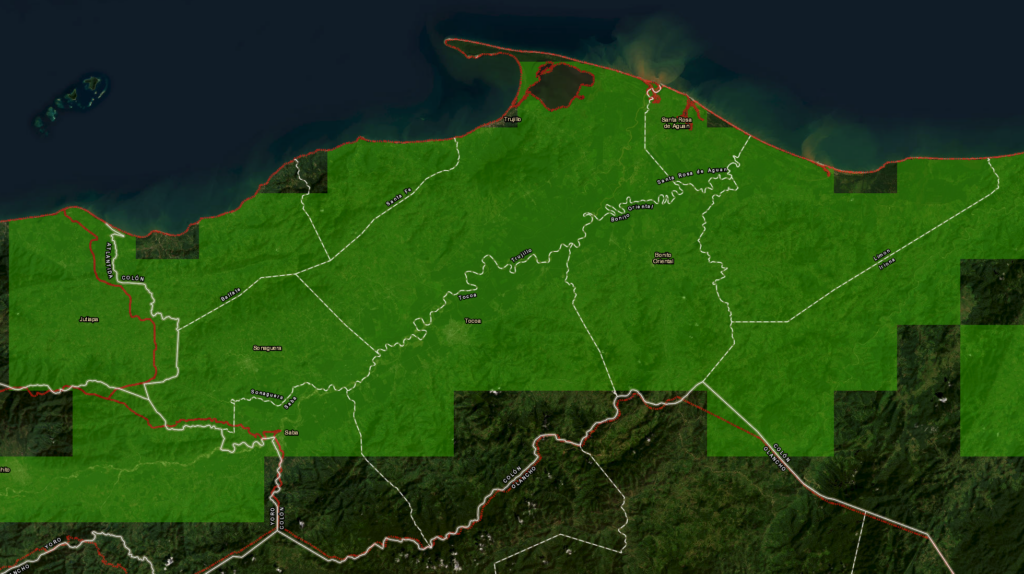
“This is my house. It is a future for my children,” says Aguilar detailing the reasons for their struggle. She explains that recovering the lands is an enormous responsibility to the new generations. Also, to the women, she emphasizes. “Women represent a large part of the people recuperating lands, including single mothers, so it is urgent to give them access to a place to live and land to cultivate.”
María Margarita Rodríguez jokes with her compañeros while getting off the motorcycle with which she reached our group. After a brief greeting, she shares with us that the principal motivation to participate in the recuperation is her children and that the women have a prominent role in the labor of the cooperatives. Above all, she thinks that their participation in the leadership is important to counteract macho practices and promote mutual aid between campesinos.
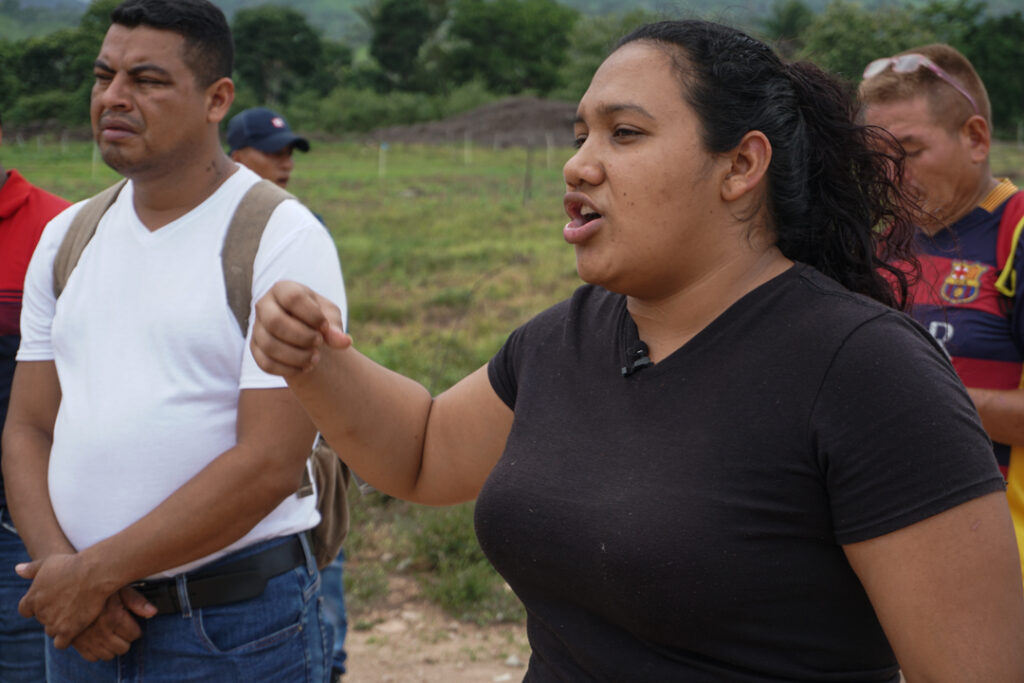
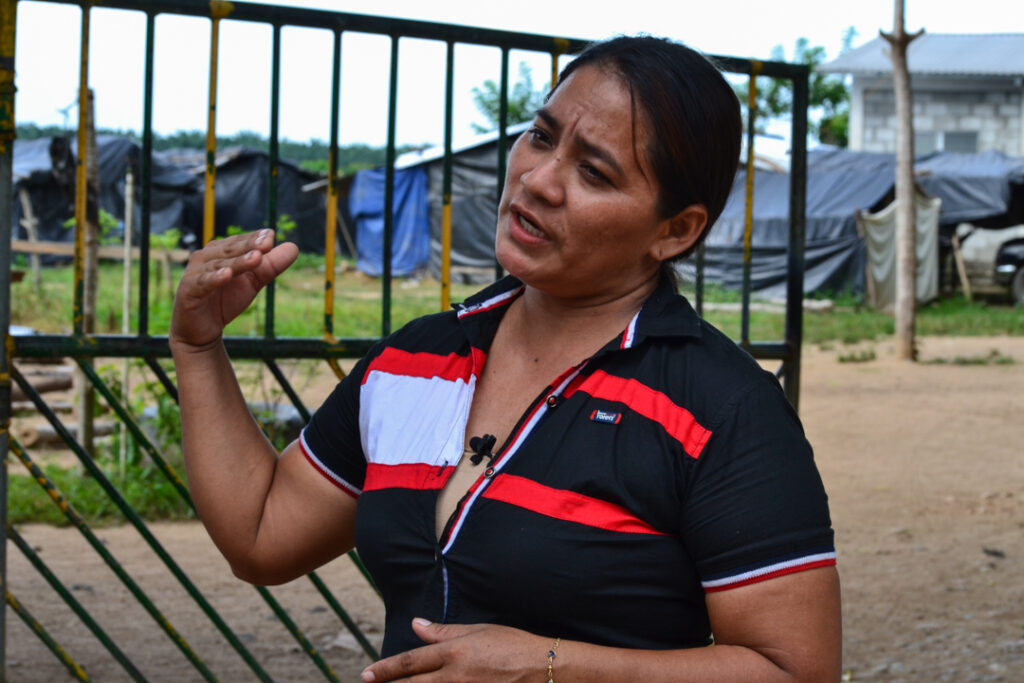
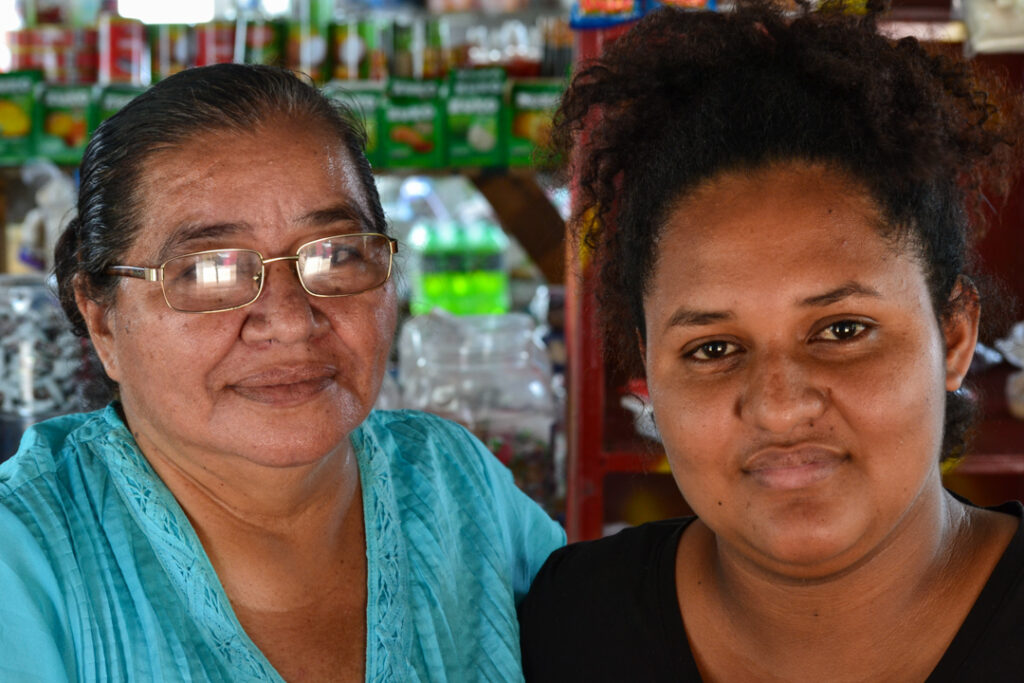
But its not all celebration. Lizeth looks sideways at the Champitas and shares with us the necessities that the cooperative still has: a health center, a school, along with basic infrastructure like drinkable water. Still with the limitations, Rodríguez emphasizes the care for the children, stressing that they, unlike other children in the region, do not work in El Chile. “We protect the children, they cannot work. The young people are given permission to study because they are the future of the cooperative,” she says.
The women also share the workings of the assembly, the decision-making body that brings together all of the associates of the cooperative. “We try to make the best decisions for the benefit of all,” details Aguilar adding that currently there are 16 campesino organizations in processes of land recuperation. Although, as she explains, “there is a need for more.” According to Wendy Castro, the recuperated surface of land carried out by these cooperatives reaches nearly 12,000 hectares.
The current occupation is not the first attempt from campesinos to manage these lands. Aguilar says that it was three decades ago when the El Chile cooperative was dispossessed from campesino hands. And since 2009, in the context of the mobilizations against the coup, they have sought the recuperation of the land, organized in the Movimiento Unificado Campesino del Aguán (MUCA).
“We have all the documentation for all the territory belonging to the El Chile cooperative,” sustained the leader regarding the land registration with the National Agrarian Institute. “If we didn’t have the documentation, we wouldn’t be here. There would have already been an eviction, but we are fighting for something that is ours,” she points out in reference to the legitimate possession evidenced with the property title. This title, dated March 1991, refers to the property of the Campesino Cooperative El Chile.
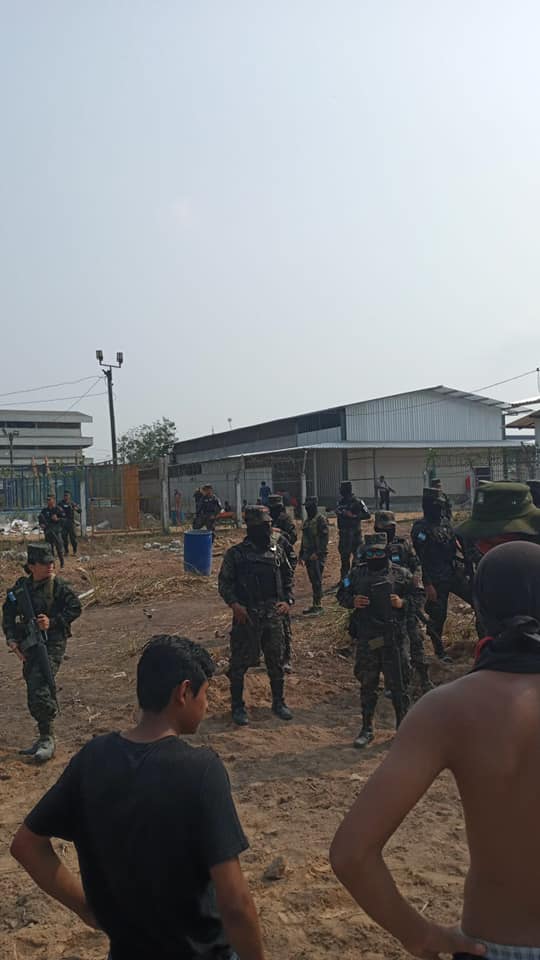
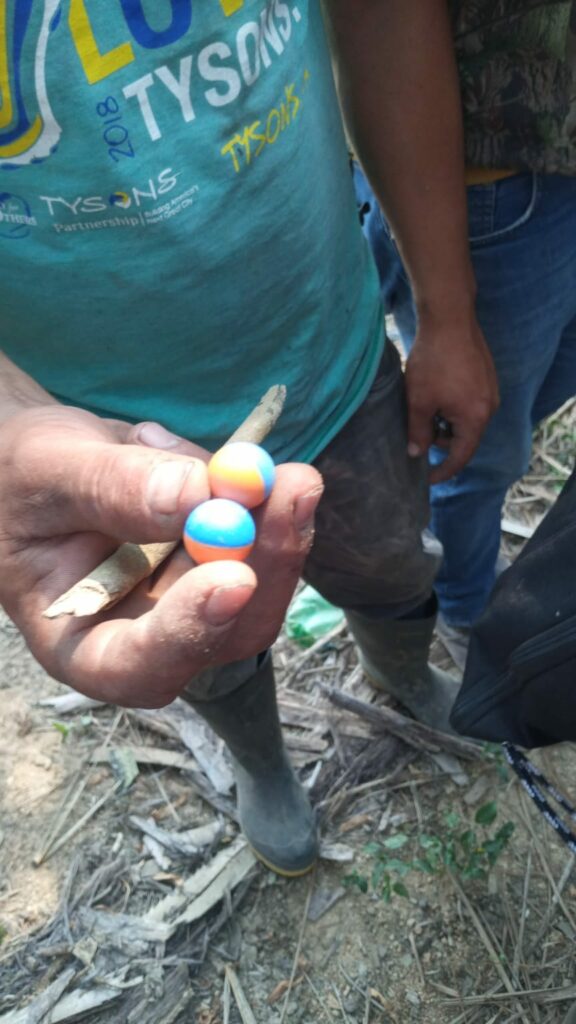
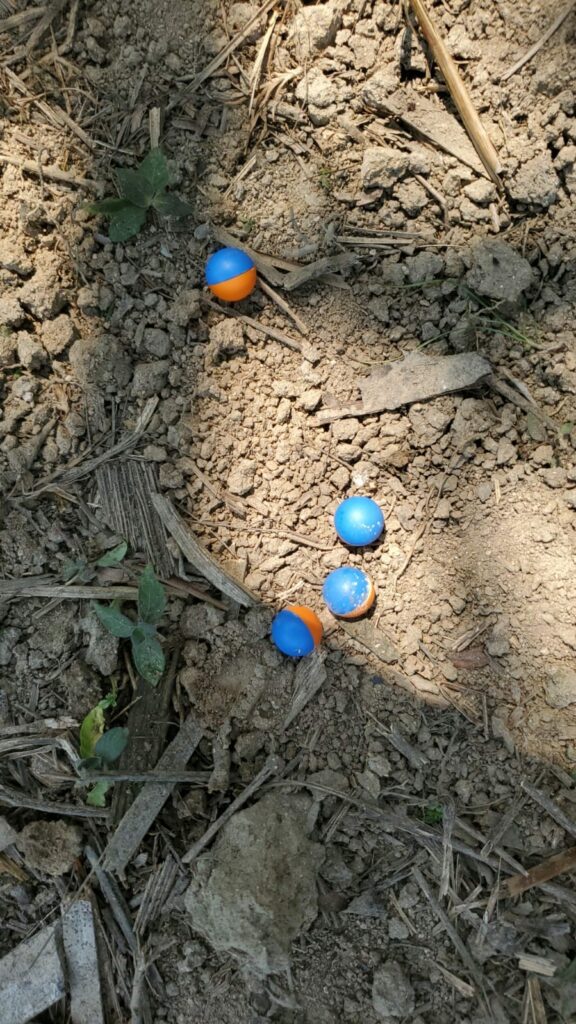
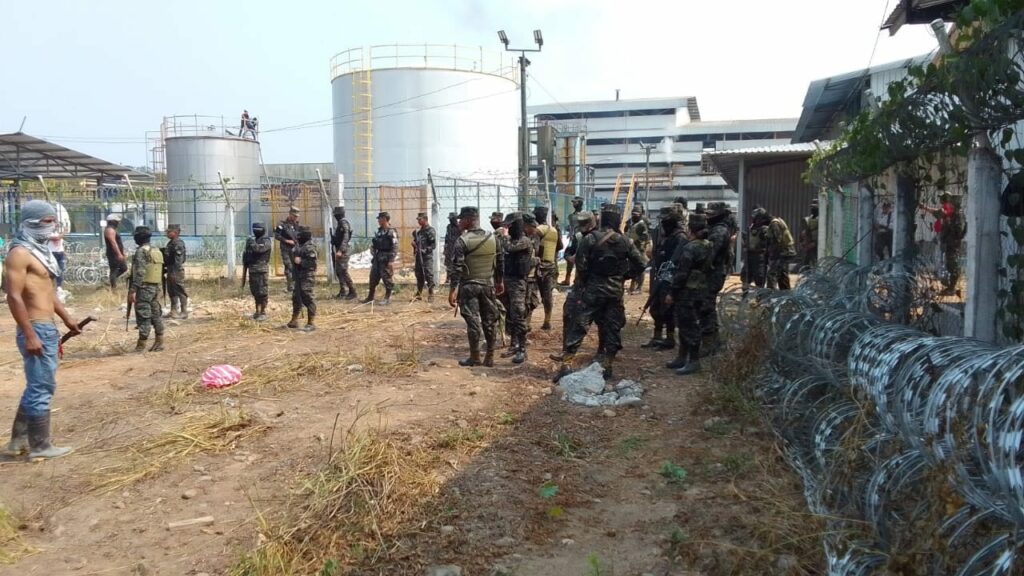
Fulfillment of the Agreement at a Slow Pace
The campesinos continue the struggle initiated by their relatives demanding via another front the fulfillment of the agreement signed with the national government in February 2022.
Above all, they are interested in the conformation and operation of the Comisión Tripartita (CT) whose work will be to investigate the techniques and methods of dispossession being used in the last 30 years by the agroindustrialists. “The government has shown a willingness in word, but in practice there is nothing,” explains Wendy Castro. After more than two years, the CT still isn’t operating because it lacks budget approval from the Honduras state.
In spite of the stagnation in the work of the CT, the campesino families have pressured the government and advanced in some steps related to the agreement. For example, the remediation of the lands in order to verify the legality of the buy-sell documents that, according to the platform, were obtained by means of falsification, intimidation, and violence. Thus, personal from National Agrarian Institute and the Property Institute worked this past April on the lands of 12 campesino recuperations.
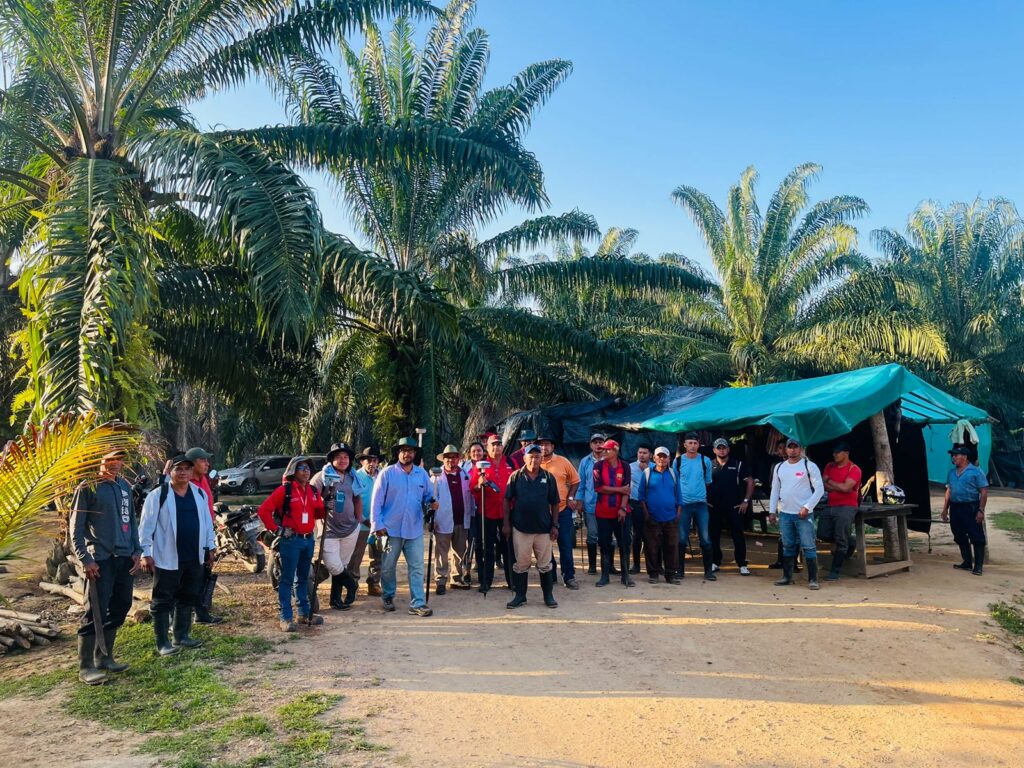
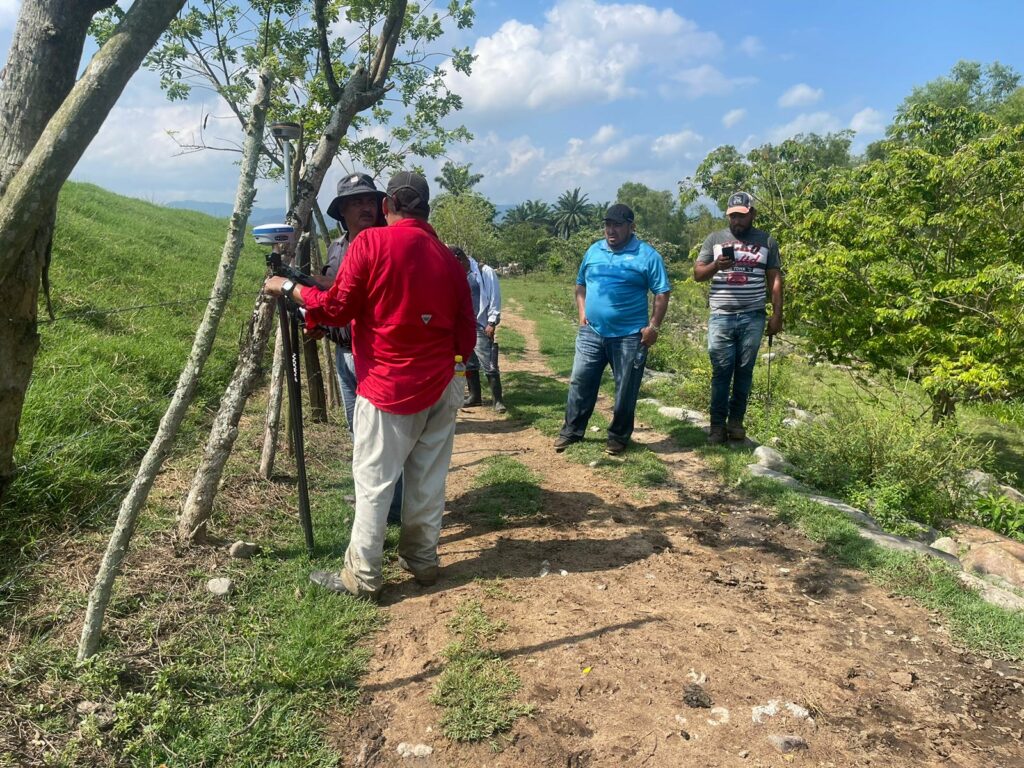
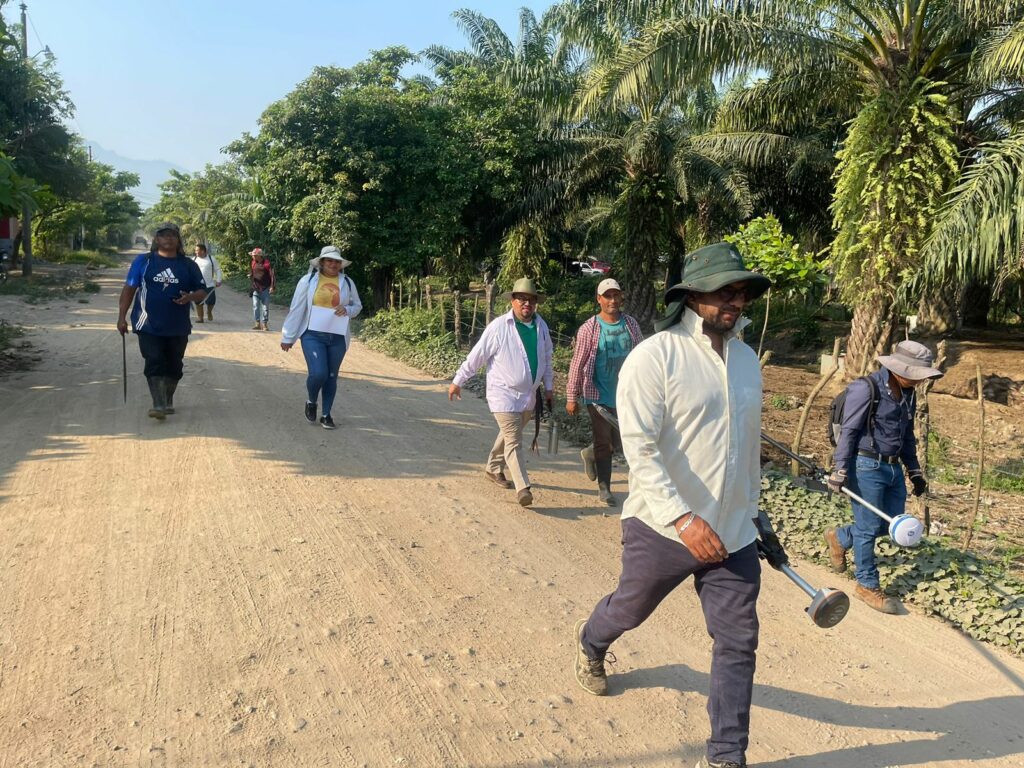
The remediation, explains Raúl Ramírez, seeks to have the Honduran agrarian institutions recognize the property titles and at the same time hand over documentation that certifies the assignation of the campesino lands to the cooperatives and associative companies that certify the land as their legitimate property.
In this context, Wendy Castro assures that the remediation helps the cooperatives’ struggle, above all because there exists a strategy of destabilization of the Corporación Dinant to inhibit the intentions of recuperation, handing over small plots of land to criminal and paramilitary groups.
“Some of the cooperatives were having difficulties with land owners and criminal groups that Corporación Dinant had given them in an area they can exploit in exchange for them intimidating us,” she explains. “The same day as the remediation, there was a Corporación Dinant car, with an SEC security guard, taking photos of people who were carrying out the remediation,” explains the member of the platform. Armed guards contracted by the agroindustrialists have been responsible for numerous massacres.
According to a complaint filed with the public prosecutor’s office in January 2023 by the Agrarian Platform of Aguán, there is coordination between Dinant, the security guards, and the criminal group known as “Los Cachos.”
The platform points out that the criminal group is in charge of persecuting and assassinating campesino leaders. Lead by Juan Carlos Lizama, they’ve operated in the zone since March 2022, “beneath the direction and coordination of the Dinant group and its security companies in the zone,” they state in the criminal complaint. They emphasize that, since April of 2022, they’ve occupied 10 hectares in El Chile.
“This possession by the Dinant group has been possible only with the presence of armed groups like Los Cachos, who have carried out acts of violence to prevent the revindication of the rights of the El Chile cooperative,” details the denunciation. They also share that the Dinant group has set up checkpoints to monitor the passage between cooperatives Tranvío, Camarones, El Chile, among others, using drones during different hours of the day.
Contamination, One More Danger
On a bicycle, a campesino carries his daughter and tools to work the land. Together they ride along the road which runs from the corn crops, and passes by the greenhouse, very close to the beginning of the monoculture plantations. If you look up, you are overwhelmed by the monotony of the oil palm crops. And what cannot be seen, can be perceived via other senses, like the smell of smoke that comes from less than two kilometers away at the operation of a palm oil extraction plant, owned by Exportadora del Atlantico.
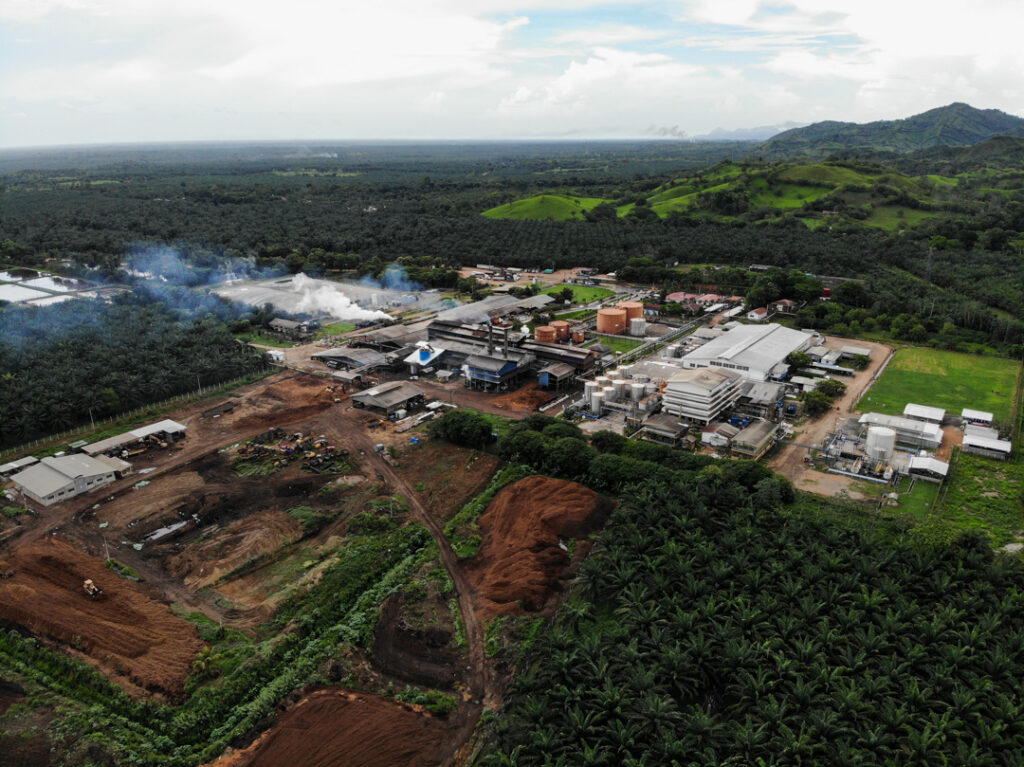
According to criminal complaints filed by the platform, Exportadora del Atlantico is responsible for the illegal acquisition of 81 properties constituting a total of 20,749 hectares. Therefore, one of the principal demands of the families in the recuperation of El Chile is the closure of this factory. Not only because, they claim, the company usurps 32 hectares of this cooperative where it is located, but because its operation and the waste that it produces contaminates the water and soil causing illnesses in the population.
Wendy Castro explains that since the land recuperation, they’ve demanded Dinant close the plant, but the campesinos have not received a response. “It will not go away because there is a lot of money at stake…the extraction plant continues to contaminate the environment, destroying the flora and fauna,” she claims.
On the World Scale
According to data from the Foreign Agricultural Service (FAS) of the US Department of Agriculture, as of 2023, Honduras is the ninth largest producer of palm oil globally.
In terms of markets, records from the Observatory of Economic Complexity (OEC) indicate that the principal destinations and values of the exportations of the palm oil from Honduras are: Italy with $155,000,000 dollars, the Netherlands with $111,000,000, El Salvador with $51,100,000, Germany with $43,000,000, and Nicaragua with $25,000,000. The OEC highlights that between 2021 and 2022, there was a sharp increase in demand from Italy, Germany, and El Salvador.
They also denounce that waste and contamination are part of a strategy used to harass campesino families. For example, Castro remembers that in May of last year, Dinant workers wanted to fence a hectare of campesino lands to construct more wells to deposit contaminated water.
For his part, Olvison Antonio Romero Mejía, General Secretary of the Cooperative, denounces that at night a greater number of boilers are active at the extraction plant, which increases the dispersion of smoke as well as chemical residue, specifically affecting children and elders.
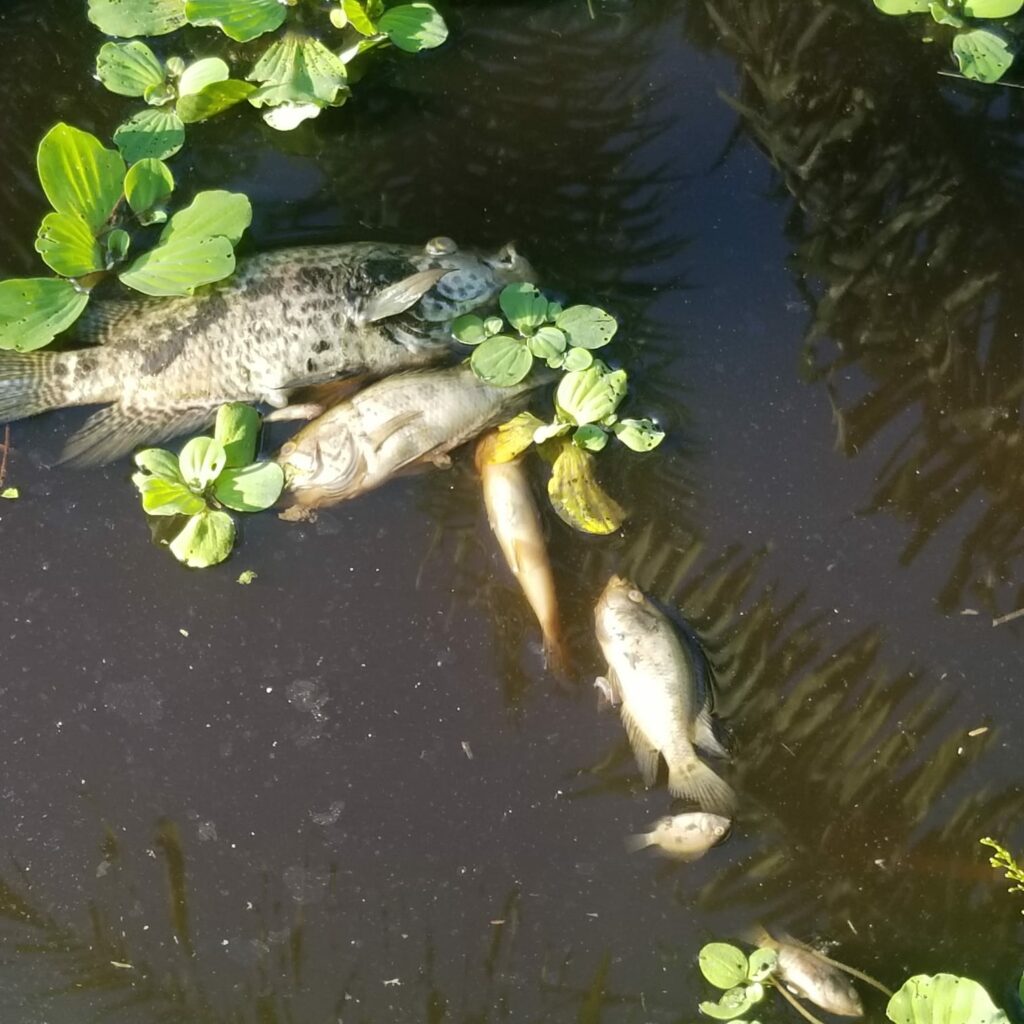
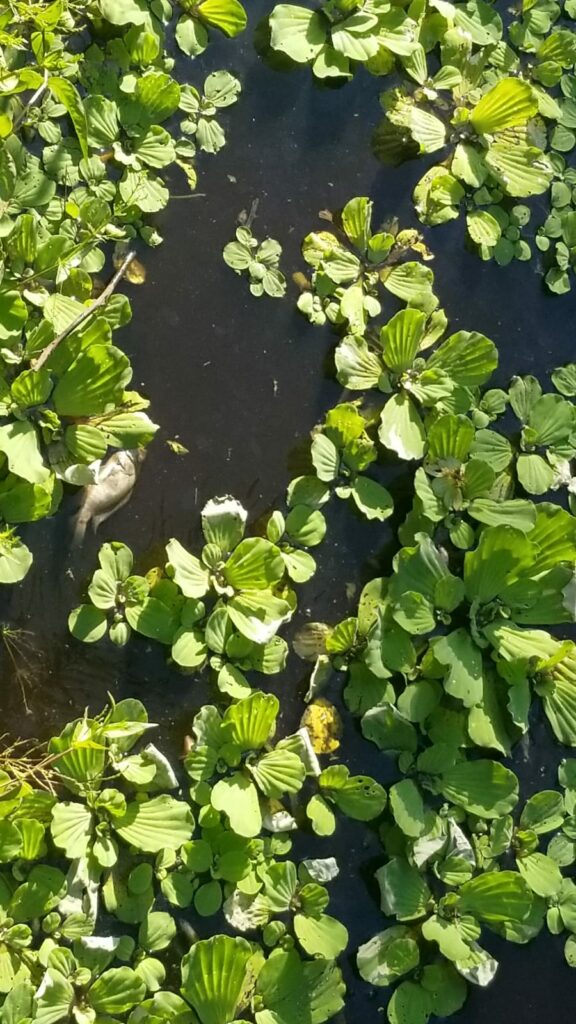
“The children have skin issues and have also developed respiratory problems,” he explains angrily. He adds that during the rainy season, the company discharges more waste, which ends up flooding parts of the recovered campesino lands.
Certifications, Image Washing
Like many of the transnational palm oil companies, Corporación Dinant is a member of the RSPO, the Roundtable on Sustainable Palm Oil, an initiative that seeks to develop standards for the expansion of the monocrop through “certified sustainable palm oil,” (CSPO).
However, its recent adherence to the select group of NGO’s and transnationals that dominate the global palm oil market and that are part of the RSPO, comes after three attempts in the last decade to gain membership. A statement from the RSPO Board of Directors, dated June 2022, briefly addresses the issue and underlines, without going into detail, that the main argument for the denial of membership was “questionable past problems.”
The RSPO itself foresees in the document that the serious accusations against companies like Dinant, will provoke larger questions around the RSPO’s reputation. In that sense, it established that, if violations of its rules occur after accepting it as a member, “there are mechanisms to sanction or expel them.”
Membership is only a first step in the certification process, which will permit Dinant to expand the sale of its products to more markets. In its reports from 2023 and 2024 to the RSPO, Exportadora del Atlantico lists its two active processing plants that are seeking the sustainability certification. The first is located in the Lean Valley. The other is the plant located in the vicinity of the El Chile recuperation.
Wendy Castro says that the palm oil produced by Dinant is stained with blood. “It is a message that we send to the people across the globe who consume this oil: look at what Corporación Dinant is doing with our families in Aguán, so that you can consume this oil in your homes, with the blood of our compañeros who have died struggling for our lands,” she says about the violent actions of the company against the campesinos.
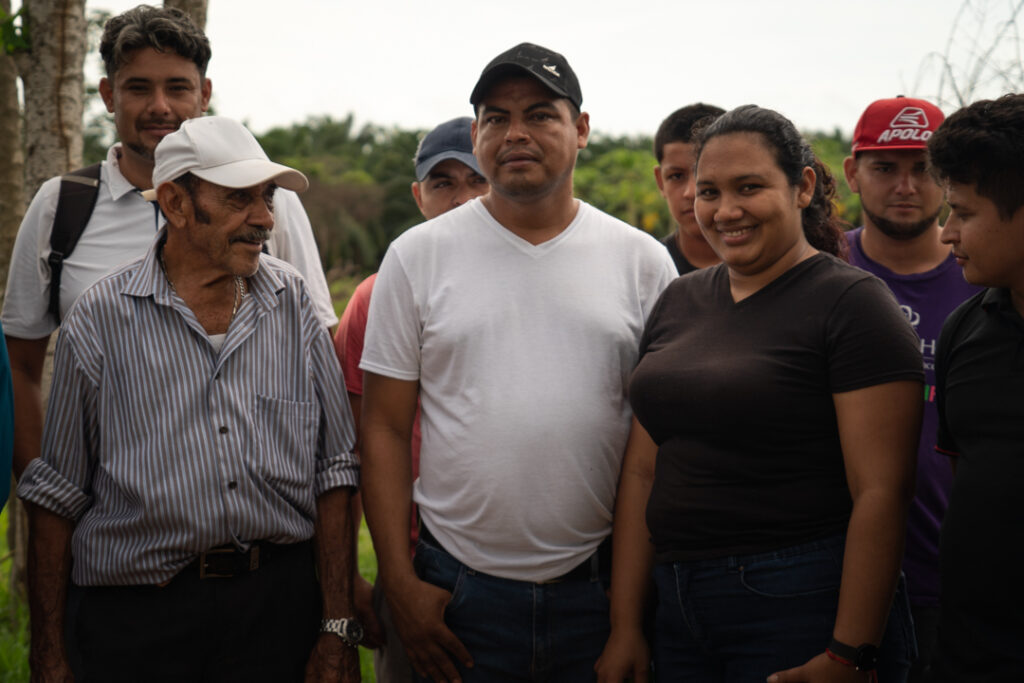
Furthermore, in their annual progress report for the RSPO from 2022, Corporación Dinant states that they plan to obtain RSPO certification for its plantations and extractors in 2024. “As campesinos we tell the RSPO that if they certify Corporación Dinant, RSPO itself will be denounced because of the dispossession, all of the lands that they have belong to campesinos, to families in need here in Bajo Aguán,” says Castro.
Wendy Castro assures that the recuperated campesino lands do not seek the accumulation of capital nor are they “a luxury,” but they represent the possibility of hundreds of families in extreme poverty to be able to work the fields to survive.
Despite the severe draught that has plagued the region for more than a year, Castro predicts the arrival of a rainy season that will assist the campesino efforts to see the corn, beans, yucca, and others food plants sprout, making possible their daily struggle.
She also asserts that, in spite of the violence, they will continue raising their voices and denouncing Corporación Dinant for criminal activities. “If they kill me, there are a lot of people in the struggle, and they will continue struggling for the lands,” she shares.
This doesn’t intimidate her. She says that the struggle will continue. “They kill one, but five more are born. We are not afraid of them, we have been through enough and we know that the land is ours,” she concludes.

